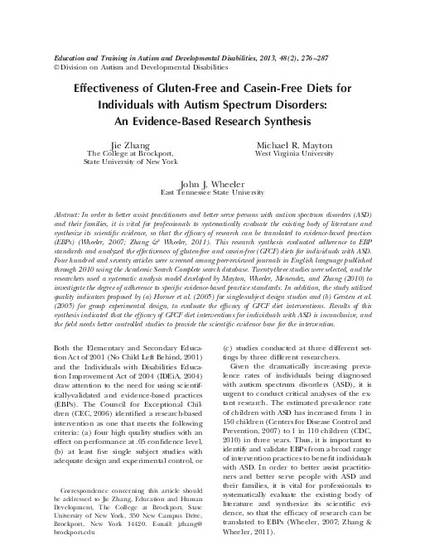
In order to better assist practitioners and better serve persons with autism spectrum disorders (ASD) and their families, it is vital for professionals to systematically evaluate the existing body of literature and synthesize its scientific evidence, so that the efficacy of research can be translated to evidence-based practices (EBPs) (Wheeler, 2007; Zhang & Wheeler, 2011). This research synthesis evaluated adherence to EBP standards and analyzed the effectiveness of gluten-free and casein-free (GFCF) diets for individuals with ASD. Four hundred and seventy articles were screened among peer-reviewed journals in English language published through 2010 using the Academic Search Complete search database. Twenty-three studies were selected, and the researchers used a systematic analysis model developed by Mayton, Wheeler, Menendez, and Zhang (2010) to investigate the degree of adherence to specific evidence-based practice standards. In addition, the study utilized quality indicators proposed by (a) Horner et al. (2005) for single-subject design studies and (b) Gersten et al. (2005) for group experimental design, to evaluate the efficacy of GFCF diet interventions. Results of this synthesis indicated that the efficacy of GFCF diet interventions for individuals with ASD is inconclusive, and the field needs better controlled studies to provide the scientific evidence base for the intervention.
Available at: http://works.bepress.com/john-wheeler/13/

© Division on Autism and Developmental Disabilities. This document was published with permission by the publisher. It was originally published by the Education and Training in Autism and Developmental Disabilities.